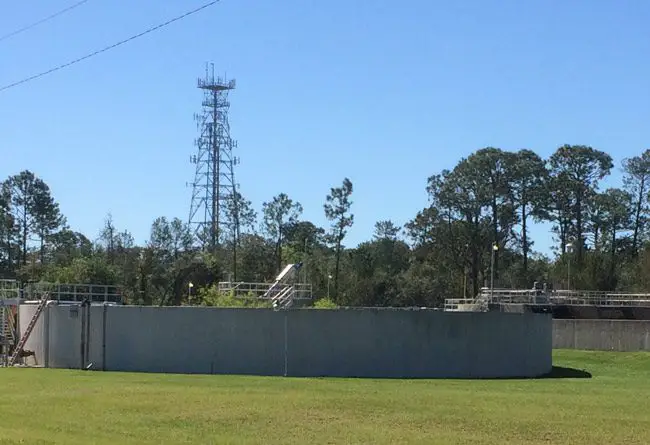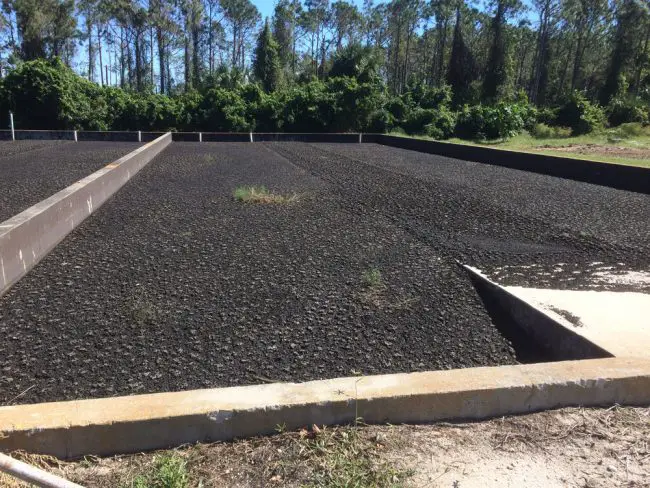
Flagler Beach residents and businesses are about to get hit with the steepest increases in water and sewer rates in memory, and with an increase in their stormwater fee as well, on top of the substantial tax increase the city commission approved last month. The commission is expected to approve the increases at a meeting this evening.
The base water rate would increase 25 percent, the sewer rate would increase 50 percent, the stormwater rate would increase 30 percent, and garbage pick-up rates would increase 10 percent. In actual dollars, that represents a combined total monthly increase of $12.28 per typical household, or an annual increase of $148.56. The overall increase averages out to 25 percent on the typical monthly bill.
More increases, albeit not as steep, are projected for coming years.
City commissioners say they have no choice because for many years, the commission let fees stagnate or increased them insufficiently to keep up with needs and repairs. And despite the increases, the bottom line for residents and businesses will not be substantially different from that of surrounding cities.
“The commission is being told by staff that without the additional revenue from rate increases for repairs and upgrades, it could lead to catastrophic failure sooner as opposed to later,” said Commissioner Rick Belhumeur, who had unsuccessfully pushed at budget time for more gradual increases.
“The city is facing enormous bills for very necessary capital improvements” in all its utilities, Jane Mealy, who chairs the city commission, said, as well as from “ramifications from Hurricane Irma and debt service and providing the needed matching funds for grants.” (The city has yet to receive any Federal Emergency Management Administration reimbursements from Hurricane Matthew or Irma).

Commissioner Marshall Shupe’s analysis went back more than a decade to note that commissions way back then did not bite the bullet, though he stressed that he wasn’t putting the blame on anyone (he himself has been on the commission five years). He empathized with rate-payers: “I would imagine it’s going to wipe out my increase in Social Security because I’m on fixed too, but I want to be sure I can drink safe water and flush my toilet,” Shupe said.
Here’s how the actual rates break down for a typical property owner, according to the proposal the city administration is submitting to commissioners tonight. (See the details in the embedded attachment below the article):
Garbage pick-up: From $18 a month to $19.80, or $1.80.
Water, base rate: From $17.30 to $21.63, or $4.33.
Sewer, base rate, from $9.33 to $14, or $4.67
Stormwater, per Equivalent Residential Unit, or the equivalent of 2,000 square feet of property, from $5.25 to $6.83, or $1.58.
“We must finally face reality and bite the bullet.”
So for the typical residential property owner, and without additional costs such as flow rates, extra water usage or irrigation costs, the overall monthly base rates will increase 25 percent, from $49.88 to $62.26, a monthly increase of $12.28 that works out to an annual increase of $148.56. The annual increase is still less than the monthly cost of, say, a choice cable package with premium movie and sports channels, but that doesn’t make it any less steep, particularly for people on a so-called fixed retirement income (though in reality every wage earner is also on an income fixed by his or her employer, and workers don’t have the immense benefit of retirees’ extra-low and subsidized Medicare premiums).
Put another way: the new Flagler Beach total monthly rate of $62.26 still comes under the current rate in Palm Coast of those four combined services, which add up to $63.93 there, with the water and sewer rate tagged to inflation, which means it increases every year in accordance with that year’s consumer price index (as of June 30 of the given year). That’s not the case in Flagler Beach.
Even after Flagler Beach’s proposed increase, water and sewer rates are substantially higher in Bunnell, Flagler County and Plantation Bay, an a fraction less in Ormond Beach, according to the city’s research.
Earlier this year the city was in line for a $450,000 legislative appropriation that would have helped lessen the blow of needed repairs and upgrades. But Gov. Rick Scott vetoed the appropriation. The city will try again to secure an appropriation, but commissioners’ hopes are low, and they have decided not to gamble. The city must also expand its wellfields, where it digs for potable water. The expansion over the next five years is projected to cost between $1 and $2 million, not including annual maintenance costs to the system.

Some 3,500 water meters also have to be replaced at a cost of $500,000 over the next three years, then come the more substantial wastewater treatment plant upgrades, which run in the multiples of millions of dollars.
“These upgrades are already in process and the rate increase is needed to fund the next phase of the project,” Belhumeur said of the wastewater treatment plant. “Underground sewer lines and pumping stations are in various stages of disrepair and need to be addressed as well. Attempts to save money in the past by taking shortcuts with previous repairs have left us without backup systems in place at our pumping stations. Another problem was the fact that this was not planned for with gradual increases over the last decade and now we’re behind the 8 ball.”
Eric Cooley, who owns the 7-Eleven in Flagler Beach and serves on the city’s economic development panel, is accepting the increases as a necessity: “As a business owner and a home owner here on the beach,” Cooley said, “I completely understand the increase and have no issue with it. Our town’s infrastructure is aging and needs repaired and improved. The sharp increases are expected due to our small tax base here in town. ” He said given the age of the infrastructure, rate increases were inevitable, “It would be naive not expect some large increases to pay for these major repairs. That’s the cost of living in a small town. We all have to chip in a little more.”
![]()
Flagler Beach Water, Sewer, Garbage and Stormwater Fee Increases in Detail (2017).
Click to access fee-increases.pdf





























Anonymous says
It seems reasonable to ask the city to make available to homeowners an outside water usage meter that does not charge you for the water used in your yard, etc. That water does not go through the sewer and I do not believe that we should be charged for that. Many many years ago, the city offered those meters and some households have them and some do not. I am sure homeowners would be willing to pay for the meter so that we could save on our monthly bills. I understand the need for additional funds and have lived here for almost 40 years and I don’t resent paying the additional cost. This is a great little beach town. However, I do believe it is not fair to be charged a sewer fee for water that does NOT go through the sewer. Perhaps a compromise by the city would make people less upset about this large increase.
TeddyBallGame says
We pay about $94/Mo for the same services in Palm Coast. Now I think we are paying too much and have been for years.
Sw says
Ouch
Ramone says
My water bill is over 100 a month now… which is ridiculous. My guess with these increases it hits 150. Need to start thinking about contracting out the garbage pickup and doing other things to save money.
bob says
We could all save money in Flagler County if all the workers only made FIVE DOLLARS per hour! YES, I am being SARCASTIC.
Pogo says
@FB Republicans
Make Mexico pay the bill.
Mark101 says
And so it begins.
Sherry says
“WATER IS THE NEW OIL” Why the likes of the Bush family and other billionaires are buying up aquifers, world wide: http://www.globalresearch.ca/the-new-water-barons-wall-street-mega-banks-are-buying-up-the-worlds-water/5383274
A disturbing trend in the water sector is accelerating worldwide. The new “water barons” — the Wall Street banks and elitist multibillionaires — are buying up water all over the world at unprecedented pace.
Familiar mega-banks and investing powerhouses such as Goldman Sachs, JP Morgan Chase, Citigroup, UBS, Deutsche Bank, Credit Suisse, Macquarie Bank, Barclays Bank, the Blackstone Group, Allianz, and HSBC Bank, among others, are consolidating their control over water. Wealthy tycoons such as T. Boone Pickens, former President George H.W. Bush and his family, Hong Kong’s Li Ka-shing, Philippines’ Manuel V. Pangilinan and other Filipino billionaires, and others are also buying thousands of acres of land with aquifers, lakes, water rights, water utilities, and shares in water engineering and technology companies all over the world.
The second disturbing trend is that while the new water barons are buying up water all over the world, governments are moving fast to limit citizens’ ability to become water self-sufficient (as evidenced by the well-publicized Gary Harrington’s case in Oregon, in which the state criminalized the collection of rainwater in three ponds located on his private land, by convicting him on nine counts and sentencing him for 30 days in jail). Let’s put this criminalization in perspective:
Billionaire T. Boone Pickens owned more water rights than any other individuals in America, with rights over enough of the Ogallala Aquifer to drain approximately 200,000 acre-feet (or 65 billion gallons of water) a year. But ordinary citizen Gary Harrington cannot collect rainwater runoff on 170 acres of his private land.
It’s a strange New World Order in which multibillionaires and elitist banks can own aquifers and lakes, but ordinary citizens cannot even collect rainwater and snow runoff in their own backyards and private lands.
“Water is the oil of the 21st century.” Andrew Liveris, CEO of DOW Chemical Company (quoted in The Economist magazine, August 21, 2008)
In 2008, I wrote an article,
“Why Big Banks May Be Buying up Your Public Water System,” in which I detailed how both mainstream and alternative media coverage on water has tended to focus on individual corporations and super-investors seeking to control water by buying up water rights and water utilities. But paradoxically the hidden story is a far more complicated one. I argued that the real story of the global water sector is a convoluted one involving “interlocking globalized capital”: Wall Street and global investment firms, banks, and other elite private-equity firms — often transcending national boundaries to partner with each other, with banks and hedge funds, with technology corporations and insurance giants, with regional public-sector pension funds, and with sovereign wealth funds — are moving rapidly into the water sector to buy up not only water rights and water-treatment technologies, but also to privatize public water utilities and infrastructure.
Anonymous says
FPL should be reimbursing FEMA for dragging ass getting power back on and not get rewarded with a rate increase. There are years that they make profit and never bother trying to give any back….it’s always give me more, give me more. They admitted themselves trucks were dispatched to Texas and weren’t here for our needs. A lot of people lost food and incurred additional expense because of FPL lying and promising power on and not delivering.
Anonymous says
I can see it now, people aren’t going to be able to afford to live at the beach and are going to scrambling looking for higher ground. There are already tons of homes for sale in Flagler Beach and in the Hammock and in many places the homes are not maintained and look like they are falling apart. First Friday may be Last Friday for some. This is why you don’t leave unqualified people on the Commission for term after terms.
mark101 says
Its simple. to many people means a lack of water and its quality for years to come. I worry more about the quality of our water. http://www.wptv.com/news/state/report-finds-florida-drinking-water-ranks-2nd-worst-in-us
palmcoaster says
I believe that the problem with at least our local utilities and also other ones like FPL is that the contributed funds for reserves shown like half of our base rates is improperly utilized for other expenses that do not happened to be for what intended like improvement and replacement of the original old infrastructure. We have seeing in the case of our Palm Coast utility water recerve funds spent to improve the surrounding infrastructure buying adjacent land paving a DOT or County access Boulder Rock to widening the south Old Kings road and contributing the CRA 5 millions if so to the benefit of the Town Center developer. Millions and millions of our utility reserve spent on TC and then when they needed to build the second sewer plant off Rte 1 about to be finished soon, (otherwise we can see the “Brownies” tank trucks so sewer do not back up in our homes, with reserves too hot in the bank then and gone now), they raised our rates. We live in Florida a state very much most run by developers greedy for our taxes to benefit them. Meanwhile all our elected officials do not inquire with guts were our utility reserves were wasted.